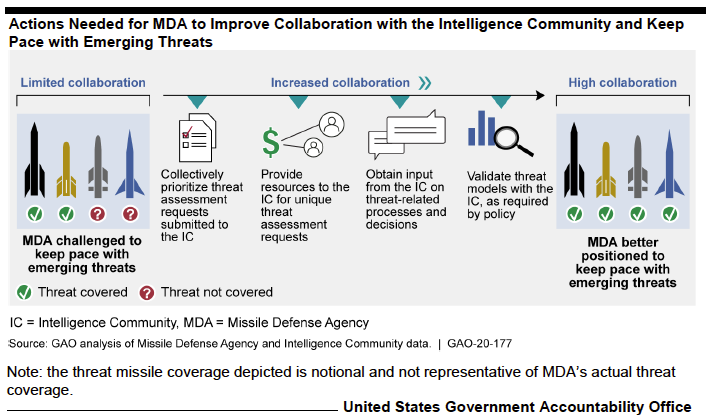The following is the Dec. 11, 2019 Government Accountability Office report, Missile Defense: Further Collaboration with the Intelligence Community Would Help MDA Keep Pace with Emerging Threats.
What GAO Found
The Missile Defense Agency (MDA) is experiencing delays getting the threat assessments needed to inform its acquisition decisions. Officials from the defense intelligence community—intelligence organizations within the Department of Defense (DOD)—told GAO this is because they are currently overextended due to an increased demand for threat assessments from a recent upsurge in threat missile activity, as well as uncertainties related to their transition to new threat processes and products. The delays are exacerbated because MDA does not collectively prioritize the various types of threat assessment requests submitted to the defense intelligence community or provide resources for unique requests, as other major defense acquisition programs are generally required to do. Without timely threat assessments, MDA risks making acquisition decisions for weapon systems using irrelevant or outdated threat information, which could result in performance shortfalls.
MDA has increased its outreach to the defense intelligence community over the past few years, but opportunities remain for further engagement on key threat-related processes and decisions. Specifically, MDA provides the defense intelligence community with limited insight into how the agency uses threat assessments to inform its acquisition decisions. MDA is not required to obtain the defense intelligence community’s input, and instead has discretion on the extent to which it engages the defense intelligence community. However, the defense intelligence community is uniquely positioned to assist MDA and its involvement is crucial for helping MDA keep pace with rapidly emerging threats. Moreover, this limited insight has, in part, prevented the defense intelligence community from validating the threat models MDA builds to test the performance of its weapon systems. Without validation, any flaws or bias in the threat models may go undetected, which can have significant implications on the performance of MDA’s weapon systems. MDA and the defense intelligence community recently began discussing a more suitable level of involvement in the agency’s acquisition processes and decisions.

Download the document here.





